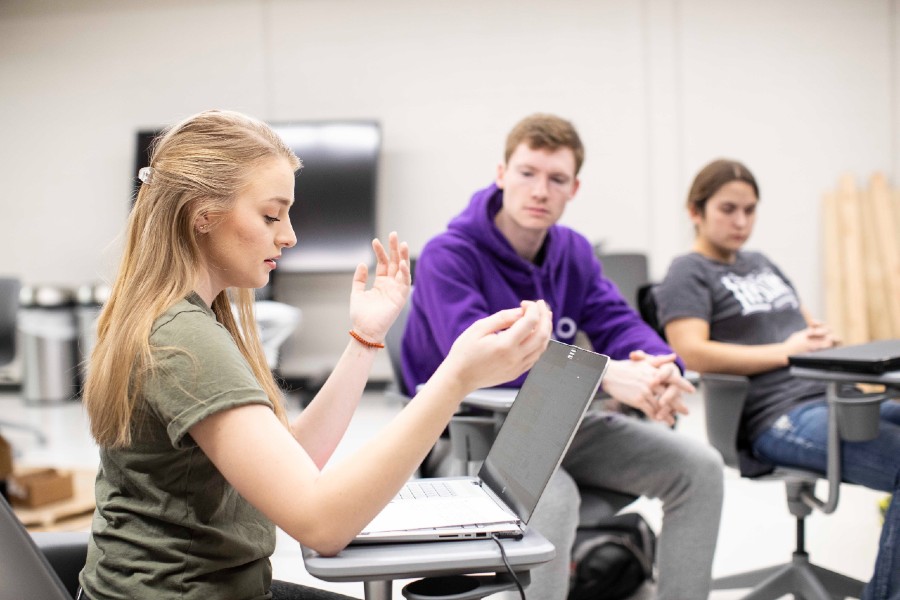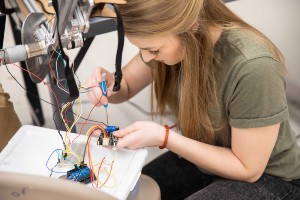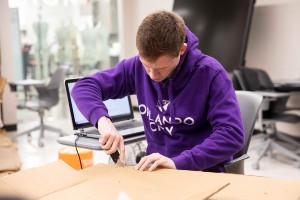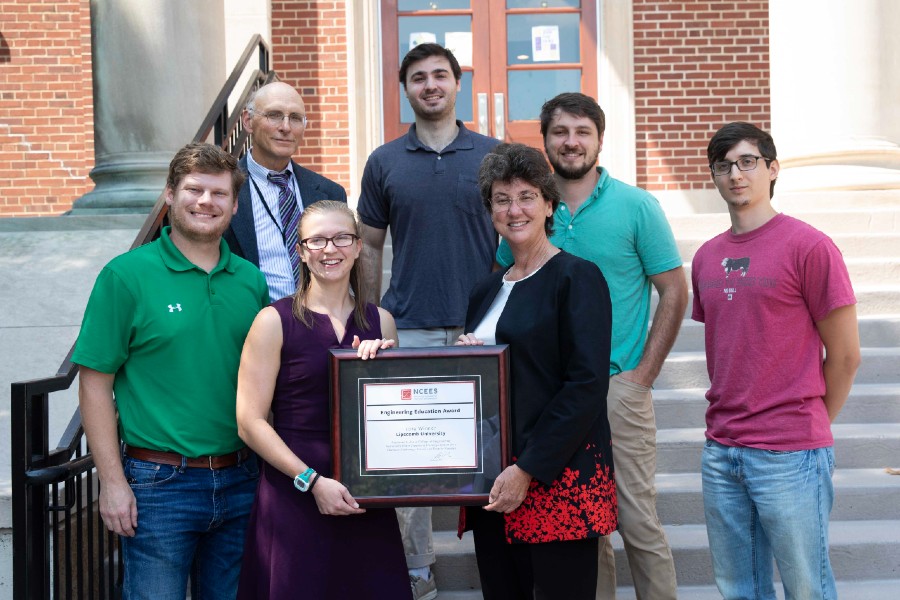Three engineering graduates achieved SALT Scholar status in 2020
Exoskeleton and Ghana wastewater treatment plan earn young engineers service-learning honor at graduation.
Janel Shoun-Smith | 615.966.7078 |

Leah Hampton and Seth Mann worked together on the exoskeleton senior design team as part of their SALT Scholar capstone project in 2020.
More than a decade ago, Lipscomb made a significant commitment to instilling a service ethic among its students by establishing the Serving and Learning Together, or SALT, program.
Through SALT, students take designated service-learning courses, they volunteer for campus-wide service activities and those who strive to become SALT Scholars take on a service-oriented internship and a capstone project in their fields of study.
In May 2020, one of the largest groups ever, 28 graduates, achieved SALT Scholar status and three of them were engineering 2020 graduates Leah Hampton, Trent Beacham and Seth Mann.

Leah Hampton, SALT Scholar
Earning such an honor does not come easy. The capstone projects of May’s SALT scholars involve serious societal issues ranging from domestic violence to food insecurity. The Raymond B Jones College of Engineering boasts five SALT Scholars since the program began in 2008.
As part of a first-time project for the College of Engineering in 2019-20, Hampton and Mann were two members of a senior design team working to create an exoskeleton, a mechanical suit to augment the wearer’s strength and abilities. Basically, a real-life version of Marvel’s Iron Man.
The exoskeleton was designed for use in the future by firefighters and was intended to compete in the Applied Collegiate Exoskeleton (ACE) Competition at Michigan State University, which was eventually cancelled due to the pandemic.
The project got Hampton and Mann wondering how much firefighters actually knew about and how they viewed the future use of an exoskeleton in their job, said Hampton. Both graduates have been heavily involved in overseas engineering mission work through Lipscomb, but they saw their SALT project as a way to apply the technology they were working on to enhance their local community, Mann said.

Seth Mann, SALT Scholar
“The whole purpose of the ACE competition is for firefighters to be able to use exoskeletons someday. Creating one prompted us to learn more about how they could be used someday,” said Mann.
Despite both the tornadoes that hit Nashville in March 2020 and the outbreak of the coronavirus pandemic, Hampton and Mann were able to conduct surveys among Nashville firefighters to collect their thoughts and supplement those results with online research on exoskeleton use.
“In the responses we have gotten, they are all pretty much in line with having a small amount of knowledge of exoskeletons (among fire-fighters), but… no negative responses to their use in the field,” said Mann.
Hampton, a mechanical engineering graduate, now works at the U.S. Department of Defense, Missile and Space Intelligence Center in Huntsville, Alabama. Mann, also a mechanical engineering graduate, works in Tullahoma, Tennessee, at National Aerospace Solutions located on Arnold Air Force Base.

MEMBERS OF LIPSCOMB'S GHANA PROJECT TEAM, including Trent Beacham, SALT Scholar, ACCEPT THE NCEES 2019 ENGINEERING EDUCATION AWARD.
Beacham, a civil engineering graduate, worked with a team to create a sustainable water treatment prototype system for the Village of Hope in Ghana, Africa, which includes an orphanage, school and hospital.
“The existing sanitation system was flawed and placed children at the orphanage, patients at the hospital and the communities downstream at risk of contracting diseases or illnesses from the untreated water,” Beacham wrote in his SALT report on the project.
It took three years to move the project through the entire engineering design process, with the system finally constructed in Ghana in 2019.
The project goal was to treat wastewater from the campus according to Environmental Protection Agency guidelines before dispelling it into the nearby river.
The system needed to be easy to construct and sustainable while also using locally sourced parts. Due to the lack of reliable electricity in Ghana, the system was designed to be powered using solar panels, placing a limit on the overall power draw.
As a system to be built in a developing country, students were required to think outside the technical design to understand social, cultural, economic and environmental impacts employing concepts like ethics, sustainability and environmental effects.
In fall 2019, the project won Lipscomb’s College of Engineering a National Council of Examiners for Engineering and Surveying Engineering Education Award. Lipscomb was one of only seven universities in the nation to receive the award that year. Beacham documented the project for submission to the NCEES to compete for the award.
Past engineering SALT Scholars include Luke Burris (’12) who, along with a team of other engineering students, designed a 75-foot, rural pedestrian bridge for a community in Guatemala. The bridge was implemented by a Lipscomb engineering mission team in May 2012.